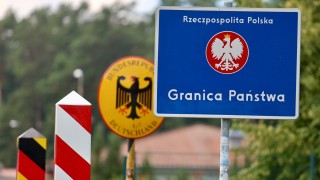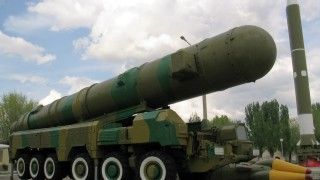- KOMENTARZ
- WIADOMOŚCI
- ANALIZA
Cold War in the Middle East: Global and European Security
The current diplomatic conflict between Riyadh and Tehran is not a sufficient reason for arise in black gold prices, but if the «cold war» in the Persian Gulf becomes a «hot spot» and captures the greater oil-producing area, the price of oil will increase - writes Nataliia Slobodian PhD, expert on energy issues on the blog of National Center for Strategic Studies at Defence24.com.
What is the conflict between Saudi Arabia and Iran?
On January 2 of the current year, Saudi Arabia announced the execution of 47 people accused of terrorism charges, including Nimr al-Nimr, aShia cleric. His execution upset Iranian protesters who subsequently stormed the Saudi embassy in Tehran the next day, ransacking the office and setting it on fire.
A citizen of Saudi Arabia, al-Nimr was a sworn opponent of the ruling dynasty. In fact, Saudi Shiites make up about 15 percent of the population of the Kingdom and live compactly, mainly in the oil rich regions of Qatif and al-Ahsa. Saudi Arabia's Shiites have long complained of discrimination, saying they cannot occupy senior government jobs and positions in the public sector.
At the beginning of the Arab Spring in 2011, Sheikh Nimr organized a demonstration against the Saudi intervention in Bahrain, in which King Al Saud backed the Sunni monarch Al Khalifa. At the time, al-Nimr had advocated for Shia power in Bahrain, as well as a separation of the Eastern Province of Saudi Arabia and its accession to Bahrain’s Shia, thereby creating a powerful Shia state in the Persian Gulf. Instead, Iran declared its readiness to defend Shiites outside of the state.
Today, Riyadh has cut off diplomatic ties with Tehran and has organized a regional coalition of countries around its further isolation. Bahrain, the UAE, Qatar, Kuwait and Sudan have since cut off or severed diplomatic ties with the Islamic Republic.
Why have the contradictions between the countries emerged only now?
Nowadays, there is a steady worldwide decline in oil prices. Some Western experts predict that in 2016 there will be a short-term situational reduction in black gold prices to $15-20 per barrel. First and foremost, this situation has frightened Iran. After the normalization of relations between Tehran and the West, Iran stands to gain about from $55 billion to $150 billion of frozen assets in the future. However, this is a modest sum in order to increase the volume of oil production. Thus, firstly, Iran is interested in «freezing» the current price of hydrocarbons and, secondly, aims to attract foreign investment into the country. Thus, increasing conflict in the region is not a strategic goal of the Rouhani government.
On the other hand, the Kingdom of Saudi Arabia recently announced a record $98 billion budget deficit. According to the Saudi Arabian Monetary Agency, the gold and foreign exchange reserves of the country declined to $648 billion at the end of October 2015 in comparison to $742 billion one year earlier[1]. If the situation remains unchanged, the Kingdom may exhaust its reserve stocks within 5 years. Under these circumstances, the government of Salman Al-Saud has focused not on the«freezing» of prices in the oil market but has instead aimed its efforts towards a reduction in social programs, increased spending, economic diversification, a reduction in subsidies and privatization in certain sectors of economy. Riyadh has shown a willingness to use economic instruments to address budget problems. In particular, the possible privatization of Saudi Aramco[2], the state-owned oil company of the Kingdom of Saudi Arabia, through an IPO was recently announced as a means to attract additional investment to the state economy[3]. However, even if the world price of black gold drops to $10-15 per barrel, the Saudi project will stay profitable given that the cost of producing oil varies from $1 to $5 per barrel.
Furthermore, Saudi Arabia is concerned about the loyalty of Western countries towards Iran's nuclear program and considers Tehran's nuclear ambitions to be a direct threat to all the countries of the Gulf region. Riyadh doubts the ability of the international community to take 100 percent control of Iranian nuclear centers. Also on the agenda is the issue of who will be the guarantor of nuclear security in the region.
Can the «cold war» between Riyadh and Tehran escalate into a «hot conflict» in the Persian Gulf?
Arising propensity toward conflict can be observed in the Middle East today on several fronts: first, five large-scale armed conflicts already operate there: the Israeli-Palestinian conflict, the civil wars in Libya, Syria, Yemen and Iraq and the expansion of the «Islamic State» terrorist group; secondly, the escalation of religious clashes through the Shiite-Sunni confrontation; thirdly, the decline in oil prices has led to the formation of two rival groups in OPEC: on the one hand Saudi Arabia and the other monarchies of the Persian Gulf that preserve or even increase the current volume of oil production, and on the other hand Iran, Russia and Venezuela, whose budgets are filled by oil revenues and who are interested in «freezing» the current situation; finally, fourthly, the ongoing Iranian-Saudi rivalry for status of geopolitical center of force is underway in the region.
I propose three possible scenarios in the Persian Gulf for your consideration:
The «cold war» scenario. Cutting off ties at the diplomatic level, Saudi Arabia and Iran may move to the level of «trade wars», a termination of transport and Iranians might be excluded from the opportunity to perform the Hajj to Mecca(in 1988, after the severance of diplomatic relations between Tehran and Riyadh, Iranian pilgrims were not allowed to perform the Hajj to Mecca). The states will form pro-Iranian and anti-Iranian coalitions that negatively affect regional cooperation and the investment attractiveness of the region. Saudi Arabia might increase oil production and expand its market of export flows, while Iran might meet difficulties in entering the market and securing its share after a long period of sanctions. Tehran might diversify its hydrocarbon export flows, preferring gas rather than oil.
The scenario of «hybrid war». Tehran and Riyadh might support the respective oppositions in their adversaries in order to achieve a coup d’état (internal upheaval) and a change of power. Today, Saudi Arabia is known as a country with "American Islam" by Iranian clerics who express a willingness to support the 15 percent Shia population and provide full support to Shia communities in Bahrain (75 percent), Kuwait (30 percent), Qatar (20 percent), Dubai (30 percent), Abu Dhabi (20 percent) and others. On the other side, the Saudi Kingdom may support the opposition, Iranian Green Movement, which organized and conducted a series of protests in Tehran in 2009-2011. In a hybrid war, the possibility of sabotage and terrorist operations in the oil and processing industries in order to undermine the enemy’s infrastructure should not be excluded. As a result, these counteractions will affect price growth in the oil market. It should be noted that large-scale internal conflict in Saudi Arabia and terrorist attacks on oilfields will impact the increase in oil prices on the black gold market.
The scenario of long-running Saudi-Iranian conflict. Confrontation between Riyadh and Tehran could reach the level of armed conflict and may cause a protracted crisis as happened during the Iranian-Iraqi conflict in 1980-1988. The Saudi-Iranian military confrontation can emerge on the territory of the Iraqi state, where Saudi citizens traditionally support the Sunni community and Iranians support the Shia community. However, this may also increase tension between Iran and Saudi Arabia to another level through the possible launching of air or missile attacks on each other. Military conflict will inevitably capture other oil-producing states in the region - Qatar, Kuwait and Bahrain - and paralyze oil tanker traffic in the Gulf. As a result of the events described, a rapid rise in black gold prices would occur. Paul Sullivan, an American researcher, forecasts that in such a situation, the price of oil may reach the mark of $300 per barrel[4].
The Persian Gulf, which has been considered to be a sphere of vital interest of the United States, has always generated political interest from the side of Moscow. For Russia, which above all seeks to become an «energy superpower», it is important to strengthen its position in the global energy space. Since the onset of the Saudi-Iranian conflict, the Kremlin has offered mediation in negotiations, trying on the role of peacemaker. It is obvious that the Kremlin will seek ways of rapprochement with the Rouhani government where military and technical cooperation and energy projects can become common points of intersection. If the decline in oil prices persists for several years, it will be more profitable for Iran to export gas than oil. Azizollah Ramezani, international affairs director at the National Iranian Gas Company, said that the geographical priorities of exports are Europe, China and India. Today, official Tehran is ready to discuss with European colleagues the establishment of gas pipeline routesto the border with Europe, for example, Iran - Turkey - Bulgaria - Greece. Therefore, Tehran may serve as a legitimate alternative supplier of natural gas to Europe instead of Moscow. Moreover, Iran is preparing to reshape Russia on the European oil market. Some time ago, after the introduction of sanctions against Iran, Russia quickly achieved its niche in Europe. Under such circumstances, it is important for Moscow to establish «bridges of friendship» with Tehran to control its ambitious goals and remain an uncontested supplier of hydrocarbons to Europe.
How will the Saudi-Iranian crisis affect the energy security of Europe?
Today, Saudi Arabia and Iran seek to diversify their economies and establish new foreign economic contacts. In particular, Saudi Arabia has announced the abolition of subsidies for food production and electricity, and, at the same time, Iran announced a series of large-scale infrastructure projects. It means that these sectors will soon require huge investments, and it may be of interest to European companies.
It is worth noting that today Saudi Arabia has an ambitious goal to develop its own nuclear program. Thus, Riyadh will be interested in the implementation of educational programs and projects. Educational and training projects may provide the basis for fruitful cooperation between EU countries and the Saudi Kingdom.
On the other hand, in the case of an escalation of tensions between Saudi Arabia and Iran to armed confrontation, there may a hydrocarbon deficit on the global level and accordingly increased price volatility for black gold. Nowadays, when the architecture of global geopolitical developments is collapsing and the world is on the verge of an energy war focusing on oil and gas conflicts, it is essential for European countries to take preventive measures to create reserves of energy resources. First and foremost, it is important to take advantage of current low oil prices and develop its strategic reserve.
Nataliia Slobodian PhD, expert on energy issues on the blog of National Center for Strategic Studies at Defence24.com.
[1]http://www.aljazeera.com/news/2015/12/oil-price-iran-saudi-economy-151221073412010.html
[2]Saudi Arabian Oil Co.-The only oil company in Saudi Arabia. It includes the second largest oil reserves in the world (261 billion barrels), whose market value is$ 319billion. Saudi Aramco sits on oil reserves which is more than 10 times the reserves of Exxon Mobil, Today Aramco controls 10% of world market
[3]http://www.vox.com/2016/1/8/10737638/saudi-aramco-ipo
[4] http://www.azernews.az/oil_and_gas/91521.html















